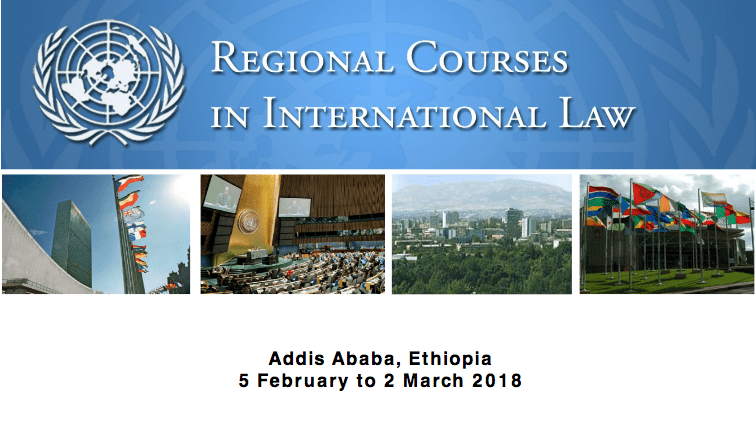Application Deadline: 20 October 2017.
The 2018 United Nations Regional Course in International Law for Africa is organized by the Codification Division of the United Nations Office of Legal Affairs in cooperation with Ethiopia, the United Nations Economic Commission for Africa (ECA) and the African Union.
The Regional Course will be held at the facilities of the ECA in Addis Ababa, from 5 February to 2 March 2018. The Regional Course will be conducted in English. The course will accommodate up to 35 participants.
The Codification Division of the United Nations Office of Legal Affairs organizes the United Nations Regional Courses in International Law for Africa, Asia-Pacific and Latin America and the Caribbean.
The organization of these courses is subject to available funding.
Objectives
The Regional Courses provide high-quality training by leading scholars and practitioners on a broad range of core subjects of international law, as well as specific subjects of particular interest to the countries in a given region. In addition, the interactive nature of the training allows the participants to share experiences and exchange ideas, which promotes greater understanding and cooperation on legal matters in the region.
The Regional Courses are intended to enable qualified professionals, in particular government officials and teachers of international law from developing countries and countries with emerging economies, to deepen their knowledge of international law and of the legal work of the United Nations and its associated bodies.
Course content
The Regional Courses consist of seminars given by prominent international law scholars and practitioners from different regions and legal systems.
The Regional Courses may include seminars on the following topics:
- Introduction to international law
- Treaty law
- State responsibility
- International peace and security
- Peaceful settlement of international disputes
- Diplomatic and consular law
- International organizations
- United Nations institutions and law making
- The Work of the International Law Commission
- African Union law and institutions
- Organization of American States law and institutions
- International human rights law
- Movements of persons
- International humanitarian law
- International criminal law
- International environmental law
- International watercourses
- Law of the sea
- International trade law
- International investment law
- Legal research
- Legal drafting
The Regional Courses are conducted in the form of interactive seminars and discussions to allow a maximum exchange of views. The participants are required to contribute to the discussions on the various topics included in the curriculum of the Regional Courses.
Application process
Qualifications
The Regional Course is open to candidates from the following countries: Algeria, Angola, Benin, Botswana, Burkina Faso, Burundi, Cameroon, Cabo Verde, Central African Republic, Chad, Comoros, Congo, Côte d’Ivoire, Democratic Republic of the Congo, Djibouti, Egypt, Equatorial Guinea, Eritrea, Ethiopia, Gabon, Gambia, Ghana, Guinea, Guinea-Bissau, Kenya, Lesotho, Liberia, Libya, Madagascar, Malawi, Mali, Mauritania, Mauritius, Morocco, Mozambique, Namibia, Niger, Nigeria, Rwanda, São Tomé and Príncipe, Senegal, Seychelles, Sierra Leone, Somalia, South Africa, South Sudan, Sudan, Swaziland, Togo, Tunisia, Uganda, United Republic of Tanzania, Zambia and Zimbabwe.
To qualify for the Regional Course, candidates must have a legal background with professional experience in the field of international law. The selected participants are required to submit a medical certificate of good health and to certify that they are able to attend the entire course period.
The 2017 Regional Course will be conducted in English. Fluency in spoken and written English is required.
Selection process
When selecting participants for the Regional Courses, due consideration is given to the candidates’ qualifications, to the scope of their professional duties, to the relevance of the training to their professional duties and to gender balance. Applications from female candidates are strongly encouraged.
Due consideration is also given to those candidates who are already present in Addis Ababa.
Financial arrangements
- The fellowships cover the fellowship recipient’s travel in economy class, accommodation, meals, medical insurance, participation in the Regional Course and the training materials. In accordance with the policies and procedures governing the administration of United Nations fellowships, participants will also receive a stipend to cover other living expenses.
- Qualified candidates may also apply for self-funded positions. Self-funded participants bear all costs associated with their participation (travel, accommodation and living expenses). Training materials and lunches during the weekdays are provided to all participants.
| Downloads: | |
| • | Brochure |
| • | Application form |
For More Information:


3 comments
Willing to have a chance
Africa needs more of this, we need to be more exposed to the global ways of thinking
[…] The United Nations Regional Course in International Law for Africa is organized by the Codification Division of the United Nations Office of Legal Affairs in cooperation with Ethiopia, the United Nations Economic Commission for Africa (ECA) and the African Union. […]